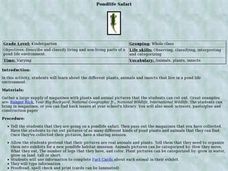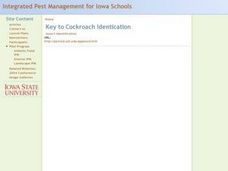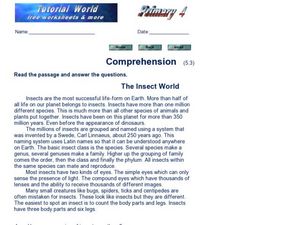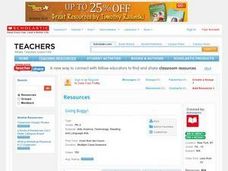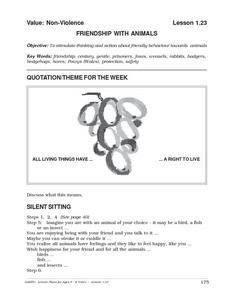Curated OER
Munching Insects
Students design an experiment to discover what types of plants particular insects prefer. They comprehend that insects eat only specific plants and that this has particular implications for noxious weeds. Students observe and collect...
Curated OER
Aquatic Insects: Water Quality Index & Diversity Index
Students search stream beds to study the life cycle and adaptations of stream insects. They explore creeks and streams to see the diversity index of creeks or streams and to find the water qualit index.
Curated OER
Bug Sweep
Students observe and categorize insects. In this insects science lesson plan, students create a bug catcher out of a coat hanger and plastic bag, then collect bugs from the schoolyard. Students count and categorize the insects according...
Curated OER
Pond-life Safari
Students determine the living and non-living parts of pond life. In this pond life lesson, students examine the plants, animals, and insects that live in ponds. They look through a variety of print media, cut out pictures, and arrange...
Curated OER
Meet the Plants
Students examine the difference between living and non-living things. In this living versus non-living lesson plan, students complete a KWL worksheet and a Living and Non-Living Chart. They examine a variety of plants and non-plants...
Curated OER
Biology In Elementary Schools
Young scholars classify animals into six major animal groups and describe the characteristics of the animals found within each group. In this living and non-living animals activity, students observe a variety of animals, both...
Curated OER
Environment: Insects and Pesticides
Students classify bugs as pest or non-pests and identify ways to control them. They also examine the three levels of pesticides by reading the labels. Students complete charts of signal words on pesticide labels.
Scholastic
Mixed Bags: Fiction and Nonfiction
Using a bag with one fiction and non-fiction book of similar topics, partners work together to find the differences and similarities of each story. They record their obervances in a T-chart.
Curated OER
Food Chain/Food Web
Students explore ecosystems. In this ecology lesson, students read an article explaining ecosystems. Students create a visual organizer with index cards using components of various ecosystems.
Prince William Network
The Incredible Journey
Divide your school gym into breeding grounds and non-breeding grounds so that your zoologists can play a game simulating the seasonal migration of shorebirds. Players pick one of the included game cards and follow its directions, which...
Curated OER
Stream Watch
Pupils discuss why it is important to take care of streams, what is non-point source and point source pollution, what are some causes of pollution in streams, and what can we do to prevent some of these causes of pollution? They steam...
Curated OER
Reading Comprehension: The Insect World
In this comprehension instructional activity, learners read a non-fiction passage titled, "The Insect World" and complete 5 short answer questions.
Curated OER
Butterfly, Butterfly: Teaching Vocabulary
Kindergarteners practice new words through listening to and reading the science book Butterfly by Jenny Feely. The teacher will first choose words that are essential for understanding the text. Then, using pictures in the text,...
Curated OER
Going Buggy
Students identify the parts of a dragonfly that they drew. They write a very short non-fiction story (mainly with pictures) about the adventure of a dragonfly. They interview a person dressed as a dragonfly to find out some things about...
Curated OER
Night Creatures of the Kalahari
Learners conduct an experiment to demonstrate how fruit fly populations are controlled by spiders. They observe a variety of environments with fruit flies and spiders and consider how vital spiders are to controlling the insect population.
Curated OER
Soil Composition
Young scholars examine soil. In this soil composition lesson students participate in soil sedimentation and filtration activities. The young scholars discuss what non-living and living things are in soil and why it is so important.
Curated OER
If I Could Talk Like the Animals. . .
Students read and discuss a film review of the animated movie Antz and then write a monologue from the perspective of a non-human organism.
Curated OER
Living and Nonliving Things
Students photograph five objects from a bag and five objects from the outdoors. Students categorize things by living and non-living and by properties such as color, size, structure and needs. Students draw conclusions about the basic...
Pennsylvania Department of Education
Animal Classes and Their Ecosystems
Students explore animal characteristics by participating in an environment identification activity. In this animal habitat lesson plan, students discuss a range of different wild life and the ecosystems that they are a part of. Students...
Curated OER
WHAT'S ORGANIC?
Students explore how certain foods come to be certified "organic." They write the words "organic" and "synthetic" and given the definitions of each. Students are given dictionaries. They are asked: "What is organic food?" Students grow...
Curated OER
Build an Anchialine Pond
Students explore biology by conducting a nature experiment. In this pond examination lesson, students utilize recycled materials, play-doh and water to recreate a pond and its inhabitants. Students identify the different elements within...
Curated OER
Value: Non-Violence - Friendship With Animals
Students discuss the importance of respecting animals and properly providing for their needs. In a class setting, students read a story about animals and identify kind and caring actions toward the animals. After a class sing-a-long,...
Curated OER
Cricket Wars
Third graders explore living and nonliving things in a garden environment. In this garden environment lesson, 3rd graders study the effects of crickets in a garden. Students explore the interaction between living and nonliving elements.
Curated OER
Natural Gardening
Students study the effect of pesticides on plants and insects. In this gardening lesson, students discuss the importance of insects. They define pesticides, evaluate their effectiveness and the problems they might cause. Students...



